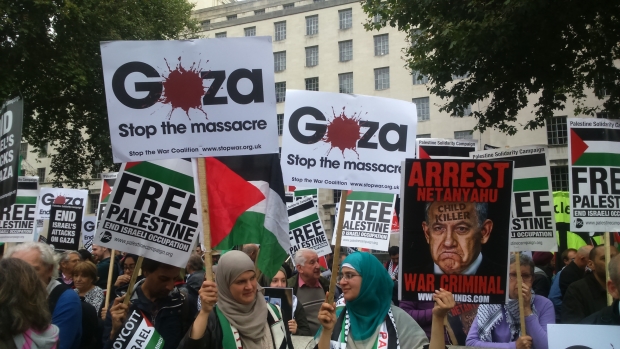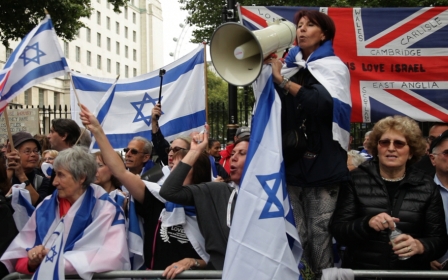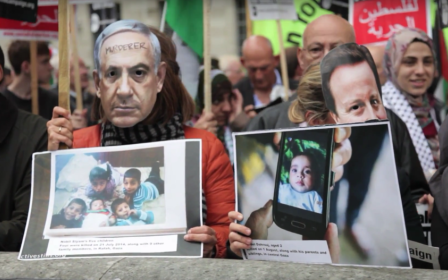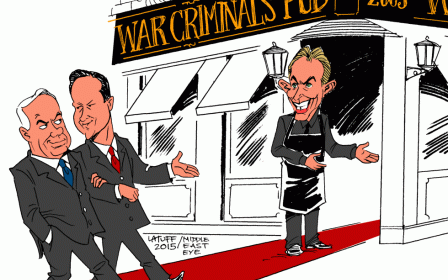Pro-Palestinian and pro-Israel protesters clash as Netanyahu visits London
Hundreds of protesters assembled outside Downing Street in London on Wednesday to both oppose and support the visit of Israeli Prime Minister Benjamin Netanyahu to the UK.
Gathering outside Downing Street in central London, demonstrators associated with pro-Palestinian organisations such as the Palestine Solidarity Campaign, Jews for Justice for Palestine (JFJFP) and Friends of al-Aqsa clashed with activists from the Zionist Federation and Christian Friends of Israel, with a number of people on both sides arrested by police.
“I’ve been on demonstrations with the Jewish Socialist Group for peace and justice in Israel/Palestine since the late 1970s,” said David Rosenberg, from the Jewish Socialist Group.
He told Middle East Eye that the politics of the group reflected the pre-Israel politics of left-wing Jews in Europe - epitomised by the Jewish Labour Bund - and dismissed the notion that Netanyahu spoke for the Jewish people.
“Netanyahu only represents the right and far-right in Israel, he doesn’t represent ordinary citizens in Israel, Jewish and non-Jewish,” he said. “He certainly doesn’t represent the views of diaspora Jews and the kind of values he holds are completely at odds with the values that diaspora Jews have had throughout their history.
“The creation of Israel was an injustice against the Palestinian people, that’s the route of the conflict,” he added.
“There’s a solution to it, which is coexistence.”
Netanyahu's visit to the UK has proven controversial, with a petition delivered to the Prime Minister's office in Downing Street calling for the Israeli Prime Minister's arrest accruing more than 100,000 signatures.
However, the British government responded by saying that, while it would attempt to pressure Netanyahu into accepting concessions, there was no prospect for his arrest as he had diplomatic immunity.
The war in Gaza in 2014, during which over 2,200 Palestinians - mostly civilians - were killed, along with 67 Israeli soldiers and six civilians, has been a major focus for protests by pro-Palestinian activists.
Allan Hogarth, Amnesty International UK's head of policy and government affairs, said on Wednesday that British Prime Minister David Cameron must pressure Netanyahu during his meeting to lift the blockade of Gaza.
“David Cameron should be direct with Benjamin Netanyahu, telling him that Gaza’s suffering is unacceptable and must end now," he said. "Israel has an obligation to end its collective punishment of Gaza’s civilian population, and completely lifting the blockade is the right thing to do.”
'Hate-fest'
The smaller, though still prominent, pro-Israel demonstration was set up next to the pro-Palestinian activists. Called by the Jewish Board of Deputies, the demonstrators sparred with the pro-Palestinian activists, though the conflict was primarily vocal rather than physical.
Arieh Miller, executive director of the Zionist Federation, told MEE that the demonstration should not be seen as a show of political support for Netanyahu, but as against what he perceived as a “hate-fest” of anti-Israel sentiment.
“You can see in their demonstration Hezbollah flags, the yellow and green flags with the rifle going through it,” he said. “They don’t care whether it's Netanyahu or the Israeli football team, they’ll protest against anything and anyone.”
He said the anti-Netanyahu demonstrators represented a “Red-Green alliance” of left-wingers and Islamists.
“The only thing they can agree on is their hatred of Israel,” he said. “They won’t agree on rights for women, rights for homosexuals, rights for education, but they will agree that they hate Israel and we’re here to stand against that hatred.”
Prior to his visit, Netanyahu warned that Europe was under threat from "militant Islam".
"We're challenged by the opposite of modernity, which is a barbaric mediaevalism, early mediaevalism, primitive, savage, murderous, that comes from the two sources of militant Islam," he said, referring to Sunnis and Shi'ites.
"Europe should support Israel - not pressure Israel, not attack Israel, but support Israel, which is the only real shield that Europe and the Middle East have against extremist Islam, which is surging."
'Show of solidarity'
A colourful collection of protesters assembled on both sides of the political divide.
On the pro-Israel side, one of the more surreal sights was a man dressed in stereotypically Irish clothing continuously dancing a jig to Irish traditional music, while holding a banner a reading "Israel is the fulfillment of Biblical prophecy.”
Both pro-Israel and pro-Palestinian demonstrators eventually joined in:
There were also arguments within the pro-Palestinian camp between Jewish activists from JFJFP and other protesters who they saw as perpetuating anti-Semitic stereotypes, such as promoting conspiracies about a proposed plan to create a "Greater Israel" in the Middle East.
Hezbollah flags at pro-Palestinian demonstrations have proved controversial in past, as many observers have accused the group of human rights abuses and promoting anti-Semitic propaganda.
“It’s a pure show of solidarity,” said Ari Sultan, a London-based Hezbollah supporter. “It’s to show that it doesn’t matter who you are, where you’re from, it doesn’t matter which political party you’re a member of, everyone should agree with, believe in and fight for human rights."
The entry of Hezbollah into the war in Syria on the side of Bashar al-Assad has meant the group is also controversial among many pro-Palestinians who support the opposition in Syria.
“I can understand how some people could be confused by what the media portrays but the fact of the matter is that we’re not there fighting for Islamic State or with Islamic State, we’re fighting against Islamic State, they’ve become an embodiment of oppression and tyranny in that land and that’s something we fight against,” said Sultan.
“We’re flying this flag to show that, as Hassan Nasrallah leader of Hezbollah said himself, it doesn’t matter what you call us, it doesn’t matter what you think of us, we will always stand by Palestine and by Gaza and that’s what we’re here to represent.”
There were a large number of Jewish activists in the pro-Palestinian camp, ranging from from the left-wing Jewish Socialist Group and JFJFP, to the anti-Zionist religious fundamentalists Neturei Karta.
Rosenberg said that, despite the turnout from the pro-Israel camp, there was a clear sea change in favour of the Palestinians in the UK.
“There’s always going to be the pro-Netanyahu element in the community, but even though they're vocal they’ve been getting smaller and smaller over the last view years,” he said.
“Zionism has been in long-term decline, probably since the Lebanon war of 1982. It had its heyday in the 60s and 70s and after the Second World War.”
Middle East Eye propose une couverture et une analyse indépendantes et incomparables du Moyen-Orient, de l’Afrique du Nord et d’autres régions du monde. Pour en savoir plus sur la reprise de ce contenu et les frais qui s’appliquent, veuillez remplir ce formulaire [en anglais]. Pour en savoir plus sur MEE, cliquez ici [en anglais].






